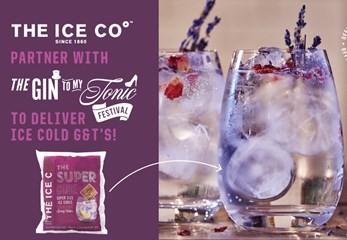The Ice Co is not only dominant in its own marketplace. As a supplier of a perishable good to major retailers, it is evaluated alongside – and frequently outperforms – some of the UK's most dynamic food and drink brands. Indeed, it recently beat out enterprises such as the "100% plant-based" food company Fullgreen and the premium bar-snack provider Made For Drink to land SME brand of the year at the prestigious Grocer Gold Awards. Those companies, just like former winners Fever-Tree, have something that can be evaluated relative to the competition, whether it be superior flavour, a distinctive brand personality or a clearly identifiable ethical stance.
The Ice Co公司不仅在自己的市场上居于主导地位,作为大型零售商的易腐商品供应商,它还和英国的一些发展势力较猛的食品饮料品牌平起平坐,而且频繁超越它们。事实上,它最近击败了“100%植物”食品公司Fullgreen和优质酒吧小吃供应商Made For Drink等企业,在著名的“杂货商金奖”中获得了年度中小企业品牌奖。这些公司就像以前的赢家Fever-Tree一样,都有一些相对于竞争对手而言值得称道的东西,比如口味俱佳、品牌个性独特、或者有明确的道德立场。
Ice, though, has no rough edges on which a consumer's imagination can find purchase. "Chaste as ice," Shakespeare wrote. "The simplest solid thing you can buy in the supermarket," noted a modern historian of the subject. Ice is perhaps the most purely fungible product any of us will ever buy: if it's clear, fits into a glass, and is solid at the freezing point of water, it has fulfilled the only meaningful criteria that most end users will ever care about.
不过,冰块并没有什么特别之处能够激发消费者的想象力找到买点。“纯洁如冰”,莎士比亚写道。“冰是我们能在超市里买到的最简单的固体物质”一位现代历史学家指出。冰可能是每个人都会购买的最纯粹的可替代品:如果它是透明的,可以放进玻璃杯里,并且在冰点时是固态,那么它就已经满足了大多终端用户所关心的唯一有意义的标准。
And so, as much as the Ice Co's success is a result of technological innovation, and of shrewdly moving in step with evolving tastes, it is also a story of near-constant struggle, as generations of icemen and icewomen have sought out ways to sell people something that has only ever been, and will only ever be, frozen water. That The Ice Co has done it on such a large scale is doubly remarkable: ice is not just featureless, it is also evanescent. How do you build an empire out of something born to melt?
所以,the Ice Co公司的成功是技术创新的结果,是精明地跟上不断变化的消费口味的结果。同时它也是一个几乎不间断奋斗的故事,一代又一代的冰人一直在想方设法向人们推销一些从未有过、也永远不会有过的东西——冰冻水。The Ice Co公司能够将这一产业做到这种规模是非常了不起的:冰不仅没有特征,而且瞬息即逝,所以如何用天生就会融化的东西建起一个帝国?

Kept below zero, ice is rock-hard, unchanging. Once it reaches its melting point, though, in a textbook example of entropy, its molecules start to agitate and chafe within their crystalline lattice, until they finally slip their hydrogen bonds and become what ice unfailingly returns to: a puddle of water.
冰在零度以下十分坚硬且姿态不变。然而,在书上的一个关于熵的案例中,冰一旦达到融点,它的分子就会在晶格内搅动、摩擦,直到它们最终脱离氢键,变成冰始终会回到的样子:一滩水。
For centuries, the history of ice was really just the history of attempting to postpone the inevitable. The enterprising hacked the stuff from icebergs and lakes and mountaintops; they transported it at no little personal risk to the houses of the rich, who constructed ice houses and ice safes in which to hoard their treasure.
几个世纪以来,冰的历史其实就是试图将必定发生的事情延后的历史。企业们从冰山、湖泊和山顶上提取冰,之后冒着很大的个人风险把它运送到富人的房子里,富人们则建造冰屋和冰保险箱将他们的财富储存起来。
The economics of transporting something very heavy and highly perishable meant that ice long remained an unattainable luxury for all but the most wealthy. Ancient potentates flaunted ice as a status symbol: in China, during the Eastern Chou dynasty, an "ice-service" detail of 94 people was kept on hand to handle any ice-related business that may occur, from chilling beverages to chilling corpses. Pliny ascribes to the Emperor Nero the invention of the ice bucket, as a method of cooling wine without diluting it with ice that had been stored in pungent straw and cloth. In 17th-century Florence, the Medici family would host elaborate feasts featuring tabletop mountain ranges sculpted from ice (they also acted as patrons to the polymath Bernardo Buontalenti, the pioneer of modern-day ice-cream).
冰块因为又重又极易融化,运输成本高,所以长期以来除了最富有的人之外,冰块对于其他人来说都是难以企及的奢侈品。古代的统治者将冰作为身份的象征:在中国东周时期,有一个由94人组成的"冰务”小组随时准备处理从冰冻饮料到冰冻尸体等任何可能发生的与冰有关的事情。普林尼将冰桶的发明归功于尼禄皇帝,即一种冷藏葡萄酒的方法,用冰桶储存的葡萄酒无需用放在难闻的稻草里或布里的冰块进行稀释。在17世纪的佛罗伦萨,美第奇家族会精心策划以冰雕的陡峭山脉为特色的盛宴(他们也是现代冰淇淋先驱、博学的伯纳多·布翁塔伦蒂的赞助人)。












